How to Find Fantastic Content for Your Social Media Feeds
Now more than ever, social media is essential for online business success. Studies show that a quarter of UK brands now see socials as their top sales channel, ahead of email marketing and conventional ads. The great thing is that you can connect with customers for free — it’s your “organic” way to generate buzz.
In an ideal world, you’d hire your own content team. But that’s a luxury well out of reach for many small-to-medium sized businesses. The challenge, then, is coming up with fresh and engaging content when time and resources might already be stretched thin.
The good news is there are plenty of slick tools and apps out there to make content discovery easy. In this (unaffiliated) list we’ll walk you through some of the best free and freemium tools for finding fantastic content fast.

Easy ways to find content for social media
Contents: Google Alerts | Topic Alerts | Subreddits | Feedly | Pocket | BuzzSumo | Tumblr | Medium | Pinterest | Quora | ContentGems | Flipboard | LinkedIn
Google Alerts
Google Alerts is a free search tool for content discovery. Simply enter your target keywords or phrases, and Alerts scans the web for new content matching your criteria. When a fresh article, blog post, or any relevant mention appears online, a notification and link gets fired direct to your email address.
Launched way back in 2003, Google Alerts certainly isn’t cutting edge. Automated rather than AI, this is a case of “if it ain’t broke don’t fix it” from Google. The Alerts tool remains an excellent resource for staying ahead of the curve online — keeping you stocked up on potential content for social media feeds.
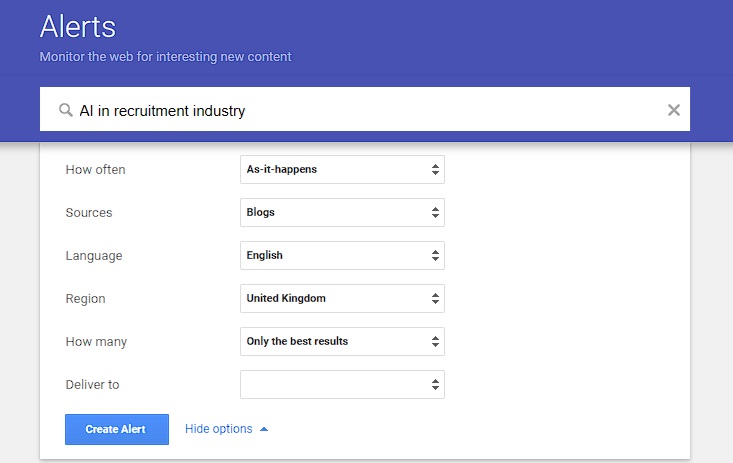
You can narrow down results by source, country, and language. Be careful about the number of alerts you create. You’ll probably want to create a dedicated inbox folder for them.
Alerts is also a very useful tool for tracking mentions of your name or brand name across the internet. Be aware that while Google finds relevant content based on keywords, this doesn’t guarantee quality, accuracy, or open use.
The same applies for every tool we mention today: be sure to check the content you find and avoid stepping on any copyright toes.
SEMrush Topic Research
Introduced by the SEO giants SEMrush, Topic Research is a powerful content strategy tool designed to combat writer’s block and identify high-performing content ideas.
Topic Research is part of SEMrush’s software suite, used by digital marketers and content creators to brainstorm topics and discover trends.
Simply enter a seed keyword related to your topic or industry. For instance, if you’re creating content for a fitness club website, you might type in “home workout routines.” With a click of the ‘Get Content Ideas’ button, Topic Research digs out a wealth of information, including popular Google Search queries and news headlines from across the web.
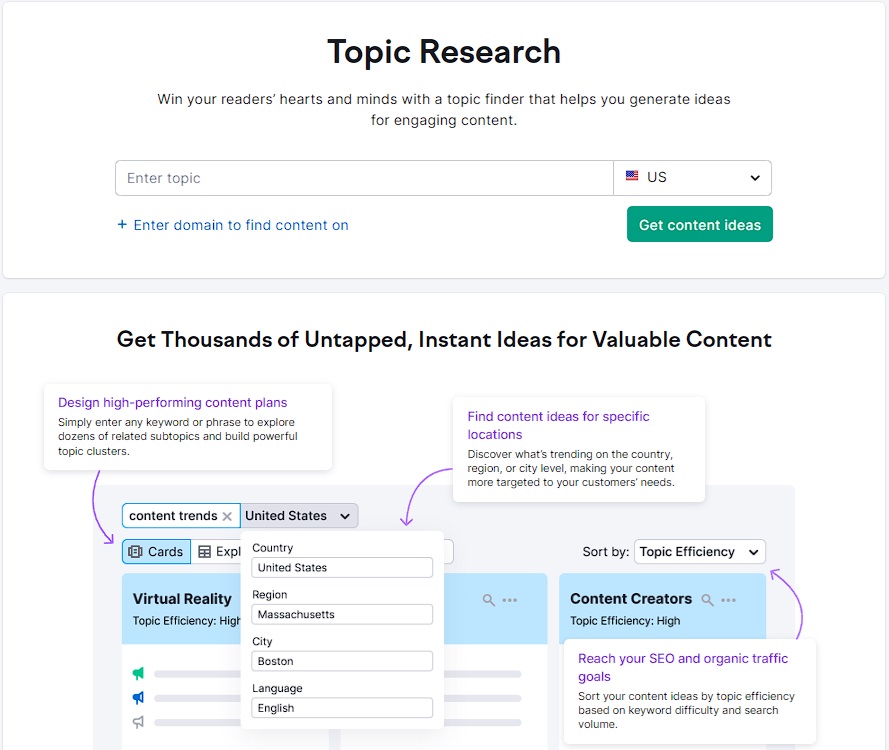
Topic Research is great for in-depth content ideation and analysising data. However, you’re limited in what you can do for free. There’s a number of plan tiers, if you’re willing to pay, and you’ll see that the app integrates well with a number of other SEMrush tools.
Keyword research is itself a great way to find relevant and trending content for your socials feeds (and ads campaigns). While SEO platforms like SEMrush, MOZ, and Ahrefs offer advanced features, Google Keyword Planner is another good free option.
See also: Local SEO in 10 – How Do I Get My Business Found Online?
Subreddits
Reddit is a wildly popular sharing and social news aggregation platform built around online communities. These groups are known as subreddits, where users can submit short posts and longer articles, images and videos. Communities can then vote on the content, deciding what gets the most attention.
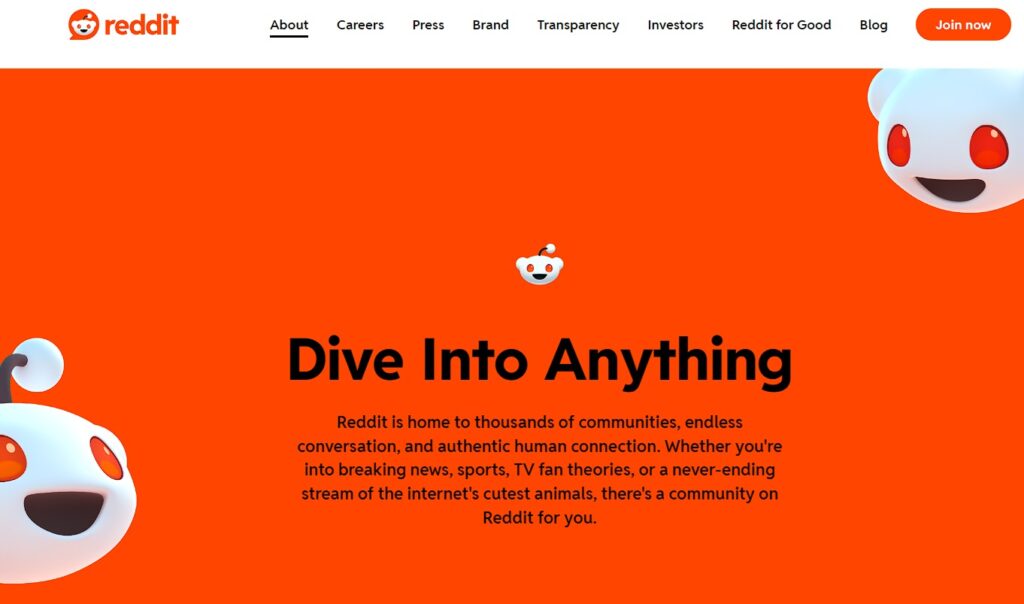
Specialised groups focus on a single topic and can be an ideal place to monitor links you can use on your social media channels. If you’re a chef or a food blogger, for example, you might want to check out the R/Food subreddit for recipes, nutrition infographics, or other things culinary.
Subreddits are a way to keep on the pulse of niche trends — especially content that might not surface on more mainstream platforms. Be sure to vet your discoveries. With a little discretion, Subreddits is a great place to discover new things.
Feedly
Feedly News Reader is a news aggregator and content reader application that acts as a hub for your favourite web content. To get going, just type a word into the search bar at the top and choose the topics you’re interested in from the list suggested. The idea is to bring together your chosen sources into one single platform, so that you don’t need to jump between websites. You can make it more relevant to your industry or niche by organising content into categories.
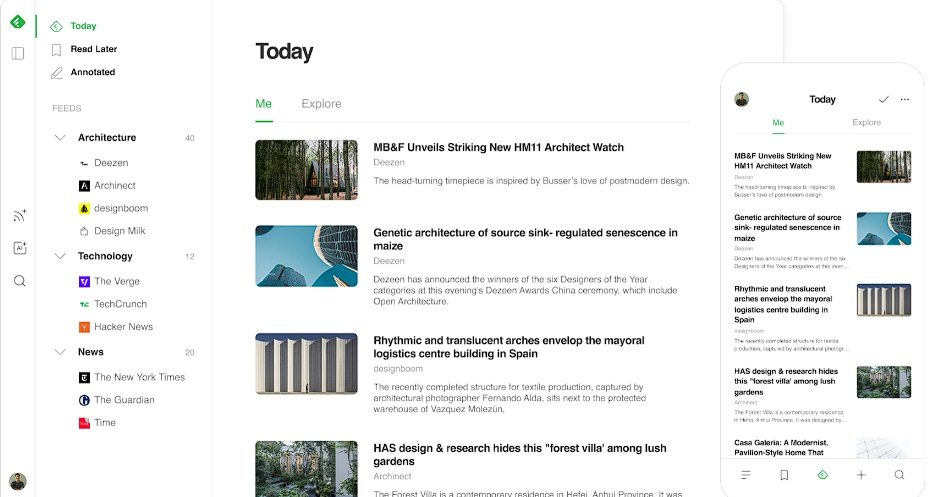
Feedly’s free plan lets you stay informed with the basics – you can see your favourite blogs and websites in one place. If you’re after something more, upgrading unlocks advanced features like unlimited sources, custom keyword searches for specific content, and integration with other productivity tools.
Originally called ‘Read It Later’, Pocket allows you to save content with a single click, building a personalised library of social media content. Unlike basic browser bookmarks, Pocket captures the entire web page, including images and videos, so you have everything you need for social media posts, even when offline. Build up a curated library of valuable content – articles, videos, infographics – anything that sparks your social media creativity.
Use it as a launchpad for crafting effective content strategies and scheduling your social media calendar. While Pocket is great for social media managers, it works well for just about any role that demands a lot of online research.
BuzzSumo
BuzzSumo is a powerful tool for finding the most-shared content on the web. More than that, it analyses social media engagement to see what content resonates most with audiences on different platforms.
By showing detailed insights into social shares, likes, and comments, BuzzSumo helps you understand what makes content popular — or what makes it go viral. That’s the “buzz”.
To use it, simply enter a keyword, topic, or competitor, and the tool will show a list of posts ranked by social shares. This helps you discover which topics or articles might engage your audience more. You can filter results by date, language, country, or content type (articles, infographics, interviews, videos). Keep in mind that, after a few searches, you’ll be prompted to upgrade to a paid plan.
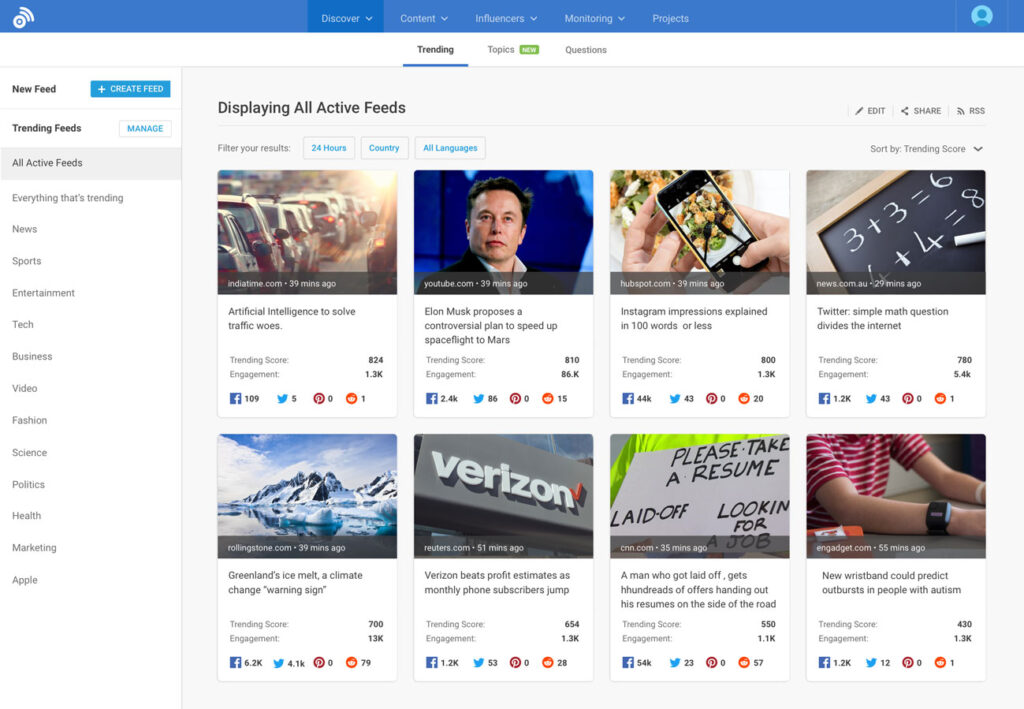
Tumblr
Tumblr is a popular platform focused on trending topics and “the internet’s favourite things”.
There’s a focus on community engagement and Microblogging, sharing shorter, more frequent posts, whether in the form of text, images, or videos. Tumblr has a reputation for spotting emerging trends. It’s a great source of original content for other social platforms, especially visual content, like GIFs, images, and memes.
One of Tumblr’s strengths is its highly customisable user profiles, so you can customise your page to your chosen industry or niche. While its popularity has waned a bit since the early 2010s, Tumblr can still be a great source for discovering unique content.
Medium
Launched in 2012 by Twitter co-founder Evan Williams, Medium has been specifically designed with long-form content in mind. As opposed to quick tweets, the platform has carved out a niche for in-depth articles, thoughtful essays, investigative journalism, and industry insights.
The platform lets you personalise your feed with specific interests on relevant topics and tags, and by following your favourite writers and publications. There’s a built-in sharing button so you can easily get things out there on other social feeds.
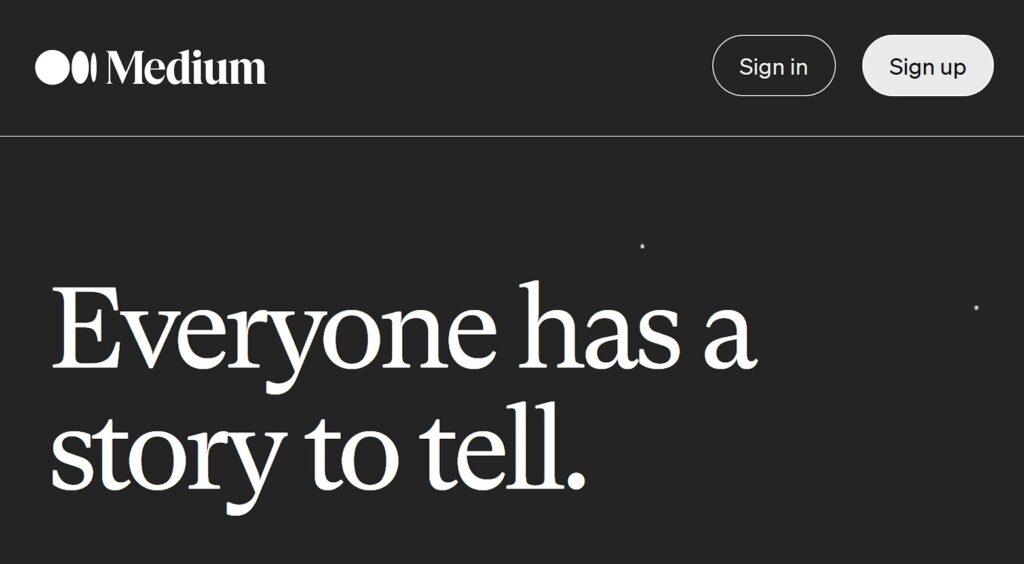
Together with LinkedIn, Medium remains (arguably) the dominant force in long-form social. Whether you’re sourcing new ideas or publishing your own content, it’s a great space for social media curators.
Pinterest Search
Pinterest emerged in 2010 as a digital bulletin board that let users collect and share inspiring images and ideas through themed “pins”. Hence the name.
Originally focused on arts and crafts, DIY, and home décor, Pinterest has since blossomed into a fully-fledged content discovery tool. It now caters to a huge number of interests, from travel and food to business strategies and education resources. Pinterest works more or less like a bulletin board: sharing is encouraged with pins geared towards topics relevant to their social media channels.
Pinterest is still particularly good when it comes to anything related to visual content — users can explore a huge collection of images, infographics, and videos, all categorised by topic. More in-depth search functions have made content easier to find, and you can easily save and organise that fodder for potential posts.
Quora
Founded in 2009, Quora is essentially a social networking in a question-and-answer format. It’s one of the most-visited sites on the internet, and it’s one of those websites you’re quite likely to arrive at by accident — usually when Googling questions it’s otherwise difficult to get an answer to (“Is it possible to train a squirrel to do my taxes?” for example).
Nevertheless, many questions on Quora are answered by professionals and knowledgeable individuals within specific fields. There’s quite a dedicated user base interested in knowledge sharing. This can be a good source of credible and informative content to share with your audience.
Scoop.it
Scoop.it may not be a gelato manufacturer, but they do make clever use of Italy’s “.it” domain extension. It’s a social media content curation platform, made with social media managers and content marketers in mind.
The idea is to help you gather content from the web – articles, videos, anything you find valuable. Instead of just saving links, this is all organised into themed collections, called “scoops.” The scoops are then served back up like mini-websites, each one focused on your chosen topics, so that it’s easier for you to get an overview. You can then easily share this content with others interested in the same things.

There’s wide social media integration, making it easy to share content with your audience across your preferred channels. Scoop.it offers a limited free plan that provides basic features. So, you can experiment with the platform and see if it works for you.
ContentGems
ContentGems is an in-browser content discovery tool designed to make it easier to keep quality social media flowing.
Instead of spending hours searching the web, it makes it easier to find fresh and engaging content relevant to what you’re after. It’s able to scan hundreds of thousands of articles from high-quality online sources every day, using algorithms to identify content relevant to your specified interests.
ContentGems has advanced filtering options that allow you to refine your content stream further. You can filter by social signals (content that’s already generating buzz), media type, or even source credibility. This can seriously cut down the time spent on content discovery and curation. As ever, there are free or paid tiers, depending on what you’re after!
Launched in 2010, Flipboard is a social news aggregator that lets you browse content in a magazine-like format. With it, you can explore and discover articles, videos, and images across diverse topics by following publications or creating custom searches. These finds can then be added as personalised magazines themed around specific interests.
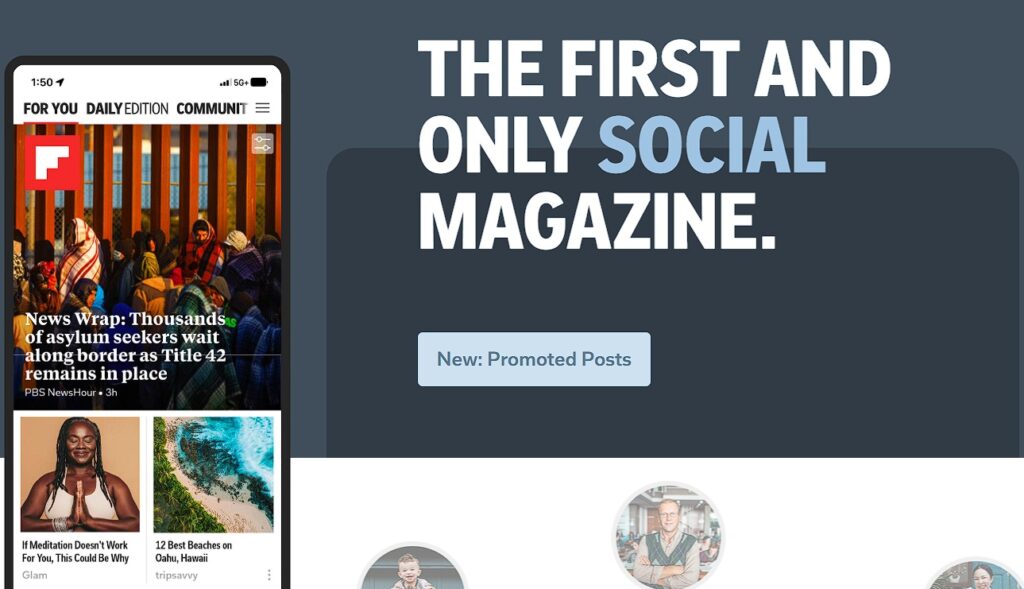
Available as an app or in-browser, Flipboard competes with rival news feed readers, like Apple News and Feedly, but arguably with more focus on user-created content. While Flipboard is free to use, there’s a limit on how many magazines you can create unless you upgrade to a paid subscription. It can be a great resource for discovering and curating engaging content to fuel your social media channels.
Yes — LinkedIn deserves a spot on this list! While it may not always get a mention alongside the other major socials, LinkedIn has emerged as an important resource (and perhaps the go-to platform) for long-form content.
LinkedIn has carved out a unique position in the social media landscape, focused on “thought leadership.” It’s not just about sharing updates or connecting with colleagues. Professionals can establish themselves as authorities in their field — sharing their expertise, sparking discussions, and engaging with interested followers.
You only need a free account to find content — or to become a Thought Leader and start publishing content yourself! LinkedIn Premium does however offer some helpful tools. InMail lets you directly message industry influencers to request content or collaborations, and advanced search filters assist in finding relevant experts and players in specific fields.
Wrap up
There are lots of free and freemium tools to help curate social media content. Use them to stay informed and discover trends. You’ll find sharing and connecting easier, too. Just be mindful about sharing content that might be protected by copyright laws. With a little creativity and respect for the work of others, you’ll be able to grow your audience and create a buzz. This can give you “organic” results to help position your online business for success.


